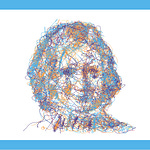Earlier this week, my colleague Adam Mastroianni published an essay on what he called "cultural oligopoly." An increasingly smaller number of artists create an increasingly larger percentage of what we watch, read, and listen to. Mastroianni presents data showing that through the year 2000 only about twenty-five percent of a single year's highest grossing movies were spinoffs, franchises, or sequels. Now it's somewhere in the neighborhood of 75%. He has similar data for hit TV shows, books, and music. Why is this happening?
My guest today is Nick Seaver, who is a cultural anthropologist at Tufts University. And for the last decade or so, Nick has studied the social processes underlying the creation of music recommender systems, which form the algorithmic basis for companies like Spotify and Pandora. I've admired Nick's work for a long time. And as an anthropologist, he is interested not necessarily in the nitty gritty details of how these algorithms are constructed, but rather in who is constructing them and what these people believe they are doing when they make decisions about how the algorithms ought to work.
The core of Nick's work centers around taste, and how these companies and their algorithms subtly shape not only what we consume, but what we like. When Nick started this line of work in the early 2010s, it really wasn't clear how big of an impact these recommender systems would have on our society. Now, his expertise gives an evermore incisive look at the central themes of many large societal conversations around the content we consume and our everyday digital existence. But I came into this conversation with Mastroianni's question at the top of my mind, and I think Nick's research can give a crucial insight, at least into one piece of the puzzle.
One of Nick's papers relates an ethnographic study of music recommender system engineers. In the interest of protecting the identity of his informants, he gives the company a fictional name, but it bears conspicuous resemblance to Spotify. As a naive observer, one might think that the way these engineers think about their audience is in terms of demography: this kind of person likes this kind of music. If they can figure out the kind of person you are, they can recommend music that you'll probably like. But that turns out not to be the dimension of largest variance.
Instead, Nick introduces the concept of “avidity.” Essentially, how much effort is a listener willing to put in to find new music? This turns out to be the first distinction that these engineers make between listeners. And it forms a pyramid. On the bottom you have what one of his informants called the “musically indifferent.” This makes up the majority of listeners. Their ideal listening experience is “lean-back.” They want to press play, then leave the whole thing alone. It is a passive listening experience — no skipping songs, no wondering what other tracks might be on the album. From there, it goes from “casual” and “engaged” listeners to the top of the pyramid, which is “musical savant.” These are “lean-in” listeners who are taking an active role in discovering new and different kinds of music.
“The challenge,” Nick writes, “is that all of these listeners wanted different things out of a recommender system.” Quoting one of his informants, codename Peter, he says: “in any of these four sectors, it's a different ball game in how you want to engage them.” As Nick summarizes it: “what worked for one group might fail for another.”
Nick continues here: "as Peter explained to me, lean-back listeners represented the bulk of the potential market for music recommendation in spite of their relatively low status in the pyramid. There were more of them. They were more in need of the kind of assistance recommenders could offer and successfully capturing them could make 'the big bucks' for a company."
Nick relates the slightly more forthcoming perspective of another engineer, codename Oliver: "it's hard to recommend shitty music to people who want shitty music," he said, expressing the burden of a music recommendation developer caught between two competing evaluative schemes: his own idea about what makes good music and what he recognizes as the proper criteria for evaluating a recommender system.
In the course of our conversation, Nick and I cover not only his studies of music recommender systems, but also his more recent studies taking an anthropological approach to attention.
We tend to think of attention as this highly individualized process. For example, of gazing into the screen of your phone or turning your head to identify the source of an unexpected noise. But attention is also a social and cultural process. We attend collectively to certain stories, certain memes, certain ideas. What exactly the connection is between these two forms of attention is not obvious. And Nick's current line of work is an attempt to draw it out.
But the larger theme here is that music recommender systems are one battle in the larger war for our collective attention. What Spotify, Netflix, and Twitter all have in common is that their success is proportional to the extent to which they can dominate our attention. This is known in Silicon Valley as the idea of "persuasive technology." And one way to begin to understand the origins of cultural oligopolies starts with Nick's observation about avidity. The vast majority of listeners or viewers tend to go with the default option with which they're presented. Another way of putting it is that their preferred mode is habitual autopilot.
While recommender systems make up just one part of this content ecosystem. This principle remains stable across its many different layers. The more we go with our habitual default options, the more control these platforms have over us. The more we rely on these companies to define our tastes for us, the more homogenous our tastes will become.
Nick's forthcoming book is “Computing Taste.” It comes out in December 2022. Keep an eye out for it.














Share this post